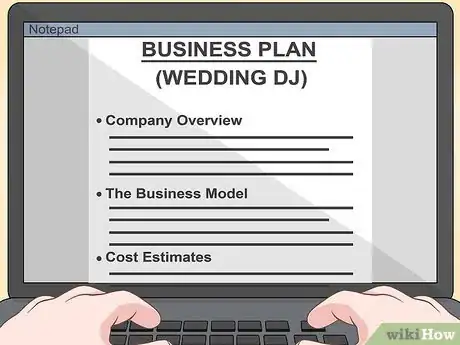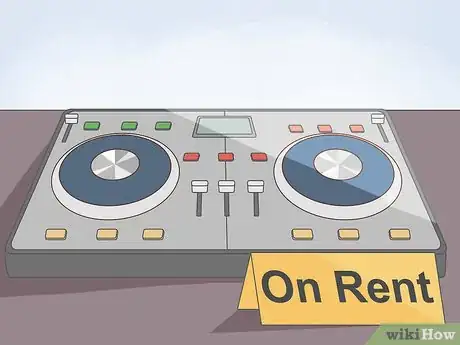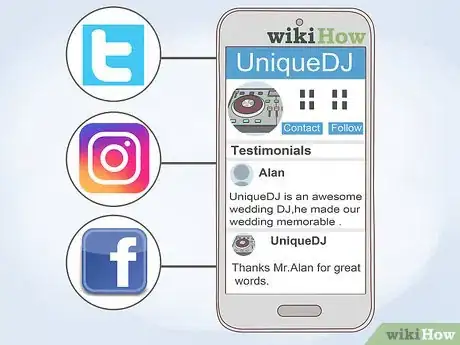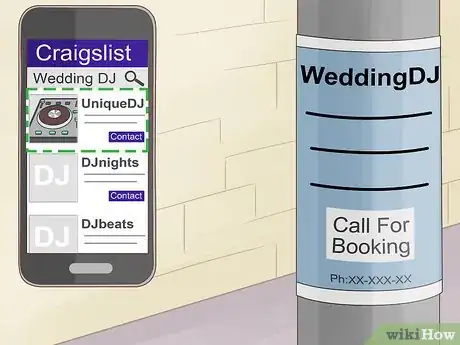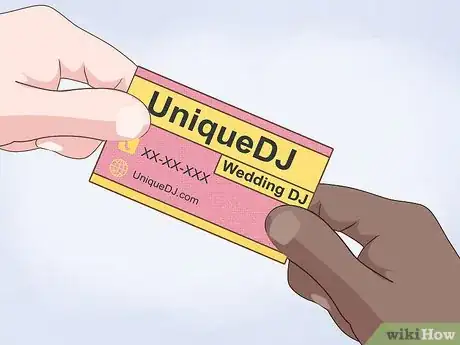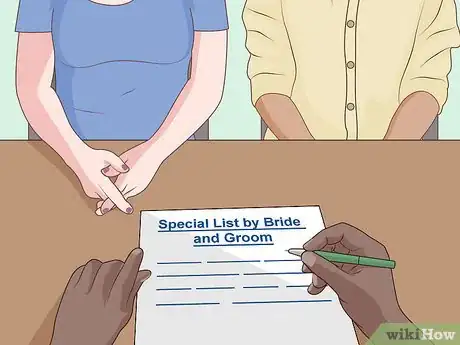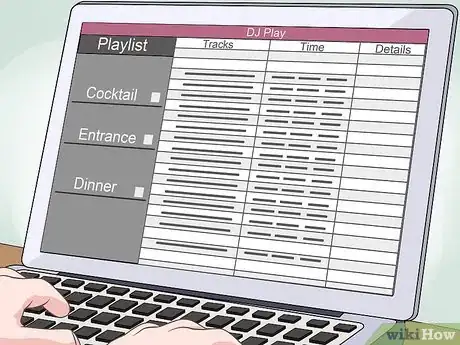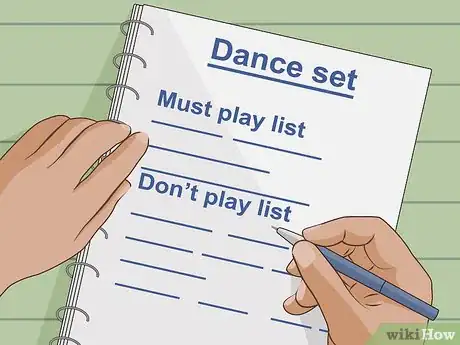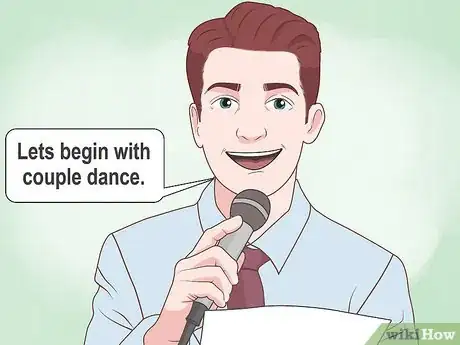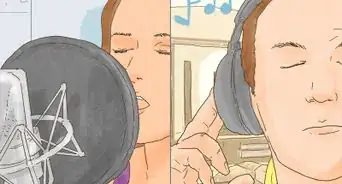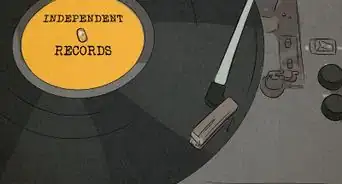This article was co-authored by Timothy Linetsky. Timothy Linetsky is a DJ, producer, and music educator that has been making music for over 15 years. He is a certified Ableton trainer and creates educational YouTube videos focused on producing electronic music. He has over 90,000 YouTube subscribers.
There are 7 references cited in this article, which can be found at the bottom of the page.
This article has been viewed 67,447 times.
A wedding DJ isn’t just someone who spins records, plays music from CDs, or puts on a light show. In addition to being the Master of Ceremonies, a skilled wedding DJ knows how to transition from one part of the wedding to the next, and how to draw the guests out onto the dance floor if they’re stuck in their seats. By carefully planning your business, marketing yourself effectively, and putting together great playlists, you’ll make the event a day to remember!
Steps
Preparing Your New Business
-
1Shadow a wedding DJ before taking the plunge. Audio equipment is expensive, so ask to observe a wedding DJ in action (with approval from the bride and groom, of course) before investing time and money in equipment and classes. Make sure that the high-pressure culture of weddings is appealing to you, since you only get one shot to help make that couple’s day perfect!
-
2Take classes on audio mixing. Expert-level DJ skills are a must for any successful wedding DJ. Take classes online or at your local community college so that you know how to mix, edit, and match songs flawlessly. DJing a wedding is not for amateurs, since you don’t get a do-over.
- Check out tutorials on YouTube so you can learn new DJing skills quickly.
Advertisement -
3Make a business plan. If you plan on making wedding DJing a large part of your income, writing out a business plan is essential. If you plan on being more of a hobbyist, you won’t necessarily need an official business plan - but make sure wedding DJing is right for you, since it can be a stressful job.
-
4Buy or borrow gear. You will need a laptop with good mixing software, an outside controller, headphones, and a speaker system.[1] Have backups of cables, speakers, laptop batteries, and other essential parts.[2]
- Feel free to buy used gear as it is cheaper, but make sure it works well before using it for a wedding. You can find used gear on Craigslist and going-out-of-business sales for clubs and restaurants.
- Some venues have their own PA systems. Verify with the venue what equipment you will need to bring to hook up your DJ software to their speakers.
-
5Set your rates. A wedding DJ is usually hired for four hours. Beginner or part-time DJs typically charge $200-300 per four hours, and intermediate DJs with at least a handful of weddings under their belt can charge $400-600. Professional and full-time DJs can charge $1,000-2,000 or more. Increase your rates slowly as you gain more experience.
-
6Write up a contract. You can download one from the internet, but make sure you are covered in case of cancellation of the wedding or loss of equipment. Put the contract (with personal details redacted) on your website so couples can see what their obligations are to you before they book with you.
Marketing Yourself as a DJ
-
1Make a website. If you have previous DJ experience (which hopefully you do!), post professional-quality photos and videos of people enjoying themselves at your past events to gain credibility.[3] Be sure to include contact information on your website, and add more photos and videos as you play more weddings.
-
2Promote yourself on social media. Start with Facebook, Twitter, and Instagram. Make a professional page that’s separate from your personal account where you can post new photos, thank previous clients, and show off how much fun you have DJing![4]
-
3Place ads online and in print. Place an ad on Craigslist and local event planning boards. Send advertisements to local magazines and newspapers to gain visibility. Include your previous DJ experience, the type of equipment you have, and a short blurb about why you’re awesome.
-
4Tell everyone you know that you’re DJing weddings. Word-of-mouth will help you get referrals for new clients. Get business cards to hand out whenever someone says the word “wedding.”
-
5Go to popular venues to get on their DJ list. Some venues have a list of popular DJs that couples can use if they don’t want to find a DJ on their own. Try to get on as many lists as you can by introducing yourself to the coordinators, giving them your business card, and asking to do an “audition.”
Putting Together a Music Library
-
1Work with the bride and groom to decide songs for the ceremony. The bride and groom might have a particular song list they want to use for the wedding party processional, bride’s processional, and recessional. If not, send them several tried-and-true options to choose from, such as “First Day of my Life” by Bright Eyes, “Here Comes the Sun” covered by the Sleepy Time Players, and “Make You Feel My Love” by Adele.[5]
- If your bride and groom prefer more traditional options, Pachelbel’s Canon in D, Claude Debussy’s “Claire de Lune,” and Bach’s “Air on the G string” are classics.[6]
-
2Make a cocktail hour, entrance, and dinner playlist. Great genres for these events include smooth jazz and classical. Match the feel of the music to the atmosphere of the venue.
-
3Plan out songs for the formal dances. These include: the father/bride dance, the mother/groom dance, and the first dance as couple. The couple may have songs in mind, but most slow, romantic songs will work. Great options include “When You Need Me” by Bruce Springsteen, “Isn’t She Lovely” by Stevie Wonder, and “Count On Me” by Bruno Mars. Send your list to the couple for approval.
-
4Create a dance set. Make sure that it’s at least two hours long, and start with a slow song to get people ready for dancing. Include a wide variety of songs that are suited for every demographic (children, young adults, and older folks). Pick songs that 85% of people would know.[7]
- Ask the couple for their list of must-play and don’t-play songs.
- Change the genre between each song that so that everyone gets a break sometimes. You want people with different music tastes to have a chance to get a drink, step outside, or talk to the couple while keeping some guests on the dance floor.[8]
Being the Master of Ceremonies
-
1Practice your public speaking. As a DJ, you’re not only in charge of the music, but also for announcing transitions from one part of the ceremony or reception to the next. Good MCs will use humor and polite, positive language when making announcements.
-
2Dodge bad requests. Send the requester for the bride for approval before you play a song that’s questionable. Watch to make sure they talk to the bride before returning to you with a verdict.
- If someone requests a song that’s on the don’t-play list, tell them politely and apologetically that the happy couple prohibited that song.
-
3Announce the last song before you play it. People want to know when they should be winding down and preparing to say goodbye to the bride and groom.
Expert Q&A
-
QuestionHow do I transition between songs while I'm DJing?
 Timothy LinetskyTimothy Linetsky is a DJ, producer, and music educator that has been making music for over 15 years. He is a certified Ableton trainer and creates educational YouTube videos focused on producing electronic music. He has over 90,000 YouTube subscribers.
Timothy LinetskyTimothy Linetsky is a DJ, producer, and music educator that has been making music for over 15 years. He is a certified Ableton trainer and creates educational YouTube videos focused on producing electronic music. He has over 90,000 YouTube subscribers.
Music Producer & Instructor Pick songs that have similar beats per minute. Pick parts of the songs that are relatively empty so you can play the songs at the same time. Then, just fade the first song out and turn up the mix on the second one.
Pick songs that have similar beats per minute. Pick parts of the songs that are relatively empty so you can play the songs at the same time. Then, just fade the first song out and turn up the mix on the second one. -
QuestionIs it possible to be a great DJ at weddings as a teenager?
 Community AnswerIt all comes down to how talented you are and the labor laws in your state. If you're 16, you're old enough to work, but there are other laws governing how late you can work, etc., which could be an issue if you're working receptions that run late into the night. Look up the laws in your state, and then try contacting wedding planners in your area, offering them your quote along with a sample of your work.
Community AnswerIt all comes down to how talented you are and the labor laws in your state. If you're 16, you're old enough to work, but there are other laws governing how late you can work, etc., which could be an issue if you're working receptions that run late into the night. Look up the laws in your state, and then try contacting wedding planners in your area, offering them your quote along with a sample of your work.
References
- ↑ http://thehub.musiciansfriend.com/dj-gear-buying-guides/how-to-choose-the-right-dj-equipment
- ↑ https://www.digitaldjtips.com/2011/08/6-essentials-for-djing-at-weddings/
- ↑ https://bandzoogle.com/blog/how-to-build-a-wedding-dj-website
- ↑ https://www.wix.com/blog/2014/11/free-ways-to-promote-yourself-as-a-dj/
- ↑ https://www.theknot.com/content/ceremony-processional-selections
- ↑ http://www.marthastewartweddings.com/225316/classic-wedding-ceremony-processional-songs
- ↑ https://www.thrillist.com/entertainment/nation/wedding-dj-secrets-how-to-dj-a-wedding
- ↑ https://www.thrillist.com/entertainment/nation/wedding-dj-secrets-how-to-dj-a-wedding


